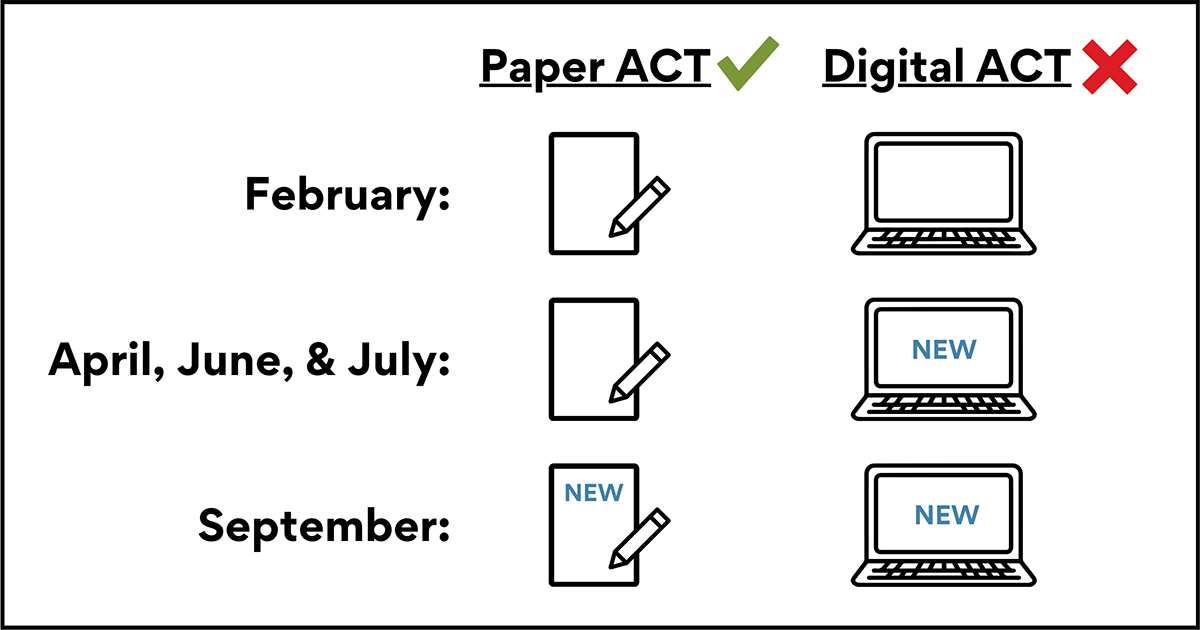© Copyright 2010-2024 Edison Prep. All rights reserved. *ACT is a registered trademark of ACT, Inc., SAT and AP are registered trademarks of the College Board, PSAT/NMSQT is a registered trademark of the College Board and National Merit Scholarship Corporation; and none were involved in the production of, or endorses, Edison Prep.
In July 2024, ACT CEO Janet Godwin published news on the evolution of the ACT—a test that has historically been slow to execute test changes, but reliable in its consistency.
Here’s what’s changing:
1. From April 2025 til July 2025, students were able to choose which version of the test they took: The paper Legacy test that died in July 2025, or the new Enhanced ACT on computer.
As of Sept. 2025, all weekend National ACT test dates will be the Enhanced ACT. Note: School-Day ACT Tests do not shift to the enhanced format until April 2026.
April 2025 – Present:

2. The newly enhanced digital test will be shorter overall, but provide more time per question.
Legacy Test (dead, ended July 2025)
| Time per question | |||
|---|---|---|---|
| English | 75 questions | 45 min | 36 sec |
| Math | 60 questions | 60 min | 60 sec |
| Reading | 40 questions | 35 min | 53 sec |
| Science | 40 questions | 35 min | 53 sec |
| 5th Test (experimental questions) | 12-28 questions | 20 min | |
| Writing | 1 essay | 40 min |
Enhanced Test (debuted Sept. 2025!)
| Time per question | |||
|---|---|---|---|
| English | 50 questions | 35 min | 42 sec |
| Math | 45 questions | 50 min | 67 sec |
| Reading | 36 questions | 40 min | 67 sec |
| Science | 40 questions | 40 min | 60 sec |
| Writing | 1 essay | 40 min |
(Students with testing accommodations can view extended time for each section on the ACT Sample Questions webpage.)
Additionally, ACT is dissolving the ‘5th test’ containing experimental items. Instead, each of the four sections will contain unscored questions.
ACT listed other structural changes as well: shorter passages in English and Reading; adding an argumentative essay to English; reducing the number of answer choices in Math from five to four, and limiting problems’ word count; and ensuring at least one Science passage features engineering and design topics.
ACT has maintained that even with these changes, the difficulty of the test will not be affected. After conducting a pilot study of a similarly adjusted format this past June, ACT claimed that student performances on the new test align closely with those on the current format (within approximately 0.1 points of the old scores).
3. Hot off the Presses: Feedback on the inaugural Sept. 2025 ACT administration from students and tutors!
In 2005, ACT made their Writing section optional; they’re following the same flexibility with the Science section in 2025. English, Math, and Reading—considered ‘core’ sections—will remain required components. For any test date, students will be able to choose whether they will include Science, Writing, or both.
Each of the four sections will remain on a 1-36 scoring scale, but students’ composite scores will be calculated as the average of their English, Reading, and Math scores (also known as an EMR score). Science will display as an additional section score—similar to the current reporting system for Writing scores. Students will still receive a STEM score, the average of their Math and Science (if taken) sections.
Important Updates as of Oct. 1, 2025:
Takeaways based on September 2025 results:
1) Edison Prep’s Student Survey Results!
Edison Prep surveyed 300+ of its September test-takers who took the inaugural Enhanced ACT and published a detailed survey of their opinions on the test! Check it out here.
2) English is now hard?
English is no longer the “gimme” that it once was. It was common for students to be able to get to 33+ on English with as few as 3 practice sections. With only 40 scored questions instead of 75, a disproportionate share of the ones removed are the freebies that were largely 8th grade
grammar. It’s a much bigger risk for students to not practice grammar nowadays; it should be an equal focus to Math and Reading from now on!
C) Math is now easy?
For the first time in history, math was the bright spot on the Sept. ACT. Most students walked out feeling that it was atrocious, but when they got their scores back were very pleasantly surprised. Everyone got their butts kicked and the curve adapts. For the first time in 100+ ACT test dates since our company started, math was the largest increase. In 90+ of those prior tests, math was uniformly the toughest to move!
D) R.I.P., Science: Edison Prep has officially revised its stance on Science Optional and unless a student is applying to Georgetown, Boston U, Pomona, or one of the tiny number of schools that want Science, students can mostly safely ignore the Science section. Especially if the U.S. News Rankings (at which all admissions offices regularly worship) use the English/Math/Reading EMR Composite score that excludes Reading, it’s hard to see Science coming back into focus for many/any schools. In our classes, we have already recorded a module for Science to put in our video curriculum and are reclaiming that former Science time in our live tutoring classes to focus on harder grammar and math content! Note: Those who may have researched Science policies a while ago will find that some schools flip flopped. E.g. Florida Bright Futures and U of South Carolina both snapped back to optional once they realized they were extreme outliers.
Note: Our admins are doing one final volley of emails and web checks for colleges regarding Science Optional in mid-October 2025 and will update www.isscienceoptional.com accordingly!
4. Students can purchase their actual ACT exam test and answers three times a year, on the October, April, and June exam dates.
Three times a year, students can buy a copy of their exam, their answers, and the answer key via the My Answer Key (MAK) service. ACT has confirmed that students taking the enhanced digital test will still have the option to purchase the MAK.
As a side note, when the College Board debuted the Digital SAT, they took away the option to purchase the test like the ACT allows you to do, which has disappointed many families. ACT is committed to allowing at least 3 of the 7 tests each year to be purchased via My Answer Key.
Our recommendations:
1. Take the paper test. Always.
The ability to write on the Math and Science sections is invaluable to a student’s score. Scrolling up and down to read English and Reading passages is a nuisance. And, there are extremely limited practice materials available that reflect the new digital format!
Our viral blog post, “Winners take the test on paper!” goes through a dozen-plus reasons why only someone who hates their college admissions chances or their parents’ pocketbook would willingly take the test on computer.
If your school day test mandates digital, that’s out of your control and is a free test, so beggars can’t be choosers.
2. Take the Science section once, or never. Take the Writing once, or never.
Science: See the note above about how the science section died off more quickly than any tutor could have anticipated. Only a dozen or so schools of 2,000 across the nation will be requiring or highly recommending the Science section. Unless you’re applying to one of those schools, feel free to skip Science. See our study on which universities are requiring Science scores at www.isscienceoptional.com!
Writing: A few schools use the Writing score (if present) for freshman English placement, but they are a small portion of schools. You’re probably safe skipping the writing section, or at most taking it once.
Does your student need help preparing for the ACT?
Edison Prep’s team of experienced tutors would be happy to help! We’ve helped prepare over 25,000 students since 2010!
Our experienced team of tutors has over 170,000 hours of tutoring experience, and our founders (the two most experienced tutors in the Southeast) teach the ACT group classes personally, all at prices far lower than the hedge-fund owned big-box prep firms charge for part-time college kid tutors!
Check out our Facebook page or www.edisonprep.com/results/ for hundreds of testimonials from happy families!







